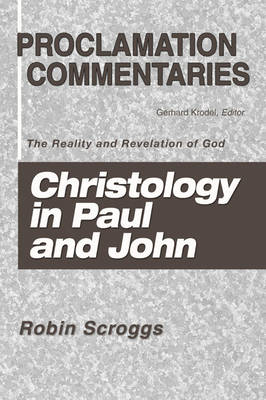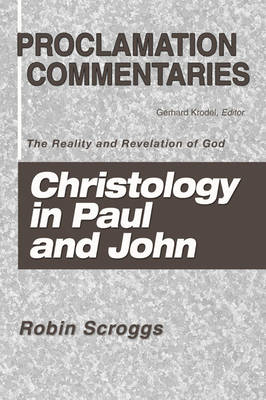
- Retrait gratuit dans votre magasin Club
- 7.000.000 titres dans notre catalogue
- Payer en toute sécurité
- Toujours un magasin près de chez vous
- Retrait gratuit dans votre magasin Club
- 7.000.0000 titres dans notre catalogue
- Payer en toute sécurité
- Toujours un magasin près de chez vous
Description
Christology should be reflections on the experience of the believer. Unless the believer has experienced something in the depth of her being, she has nothing to think about (1). How true! And how good it is to have clear insights into the Christology of two early believers, Paul and John. Parish based preachers, compelled to preach on texts from the Gospel of John and the Letters of Paul, are helped by Scroggs in their study for and preparation of sermons. Scroggs' commentary provides the opportunity first of all to grasp and understand the Christ as Paul proclaimed him in his writings. The second part of the book details the Christology of John. While the two respective Christologies are different and not dependent upon one another, put together they do give us rich insight into the question of who Jesus is and what he means for faith. In the comparison it becomes clear that Paul used legal metaphors to describe the new world made possible through the cross, while John saw Jesus as the revelation of divine reality coming from the realm of God the Father into this world of darkness. Following the discussion of the differences between Paul and John - like wrestling with two angels (105) - the author seeks to clarify some essential and underlying similarities in the Christologies of Paul and John. This relationship is discussed under three headings: Creation, The Vision of the Fallen World, and Jesus Christ as Revealer. The last three pages of the book comprise an important word to theological discussions within the church. They point out the importance of theology being Christocentric. The Christian, just as Paul and John, has experienced God through Jesus Christ, and thus cannot speak about God without speaking about Jesus Christ (111). 'Christology in Paul and John' should be in every working pastor's library.
Spécifications
Parties prenantes
- Auteur(s) :
- Editeur:
Contenu
- Nombre de pages :
- 140
- Langue:
- Anglais
- Collection :
Caractéristiques
- EAN:
- 9781597520034
- Date de parution :
- 22-11-04
- Format:
- Livre broché
- Format numérique:
- Trade paperback (VS)
- Dimensions :
- 154 mm x 227 mm
- Poids :
- 217 g

Les avis
Nous publions uniquement les avis qui respectent les conditions requises. Consultez nos conditions pour les avis.






